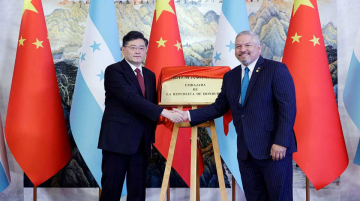
By Felix Brender
Taiwan President Tsai Ing-wen’s administration launched the New Southbound Policy (NSP, 新南向政策) in late 2016, ostensibly to reduce dependence on China. The NSP is impressive in its scope (trade collaboration, talent exchange, resource sharing, and regional connectivity) and reaches out to 18 countries in Southeast Asia, Australasia, and — notably — South Asia.
The policy fits neatly into the general outlook of Tsai’s Democratic Progressive Party (DPP), which is more weary of links with China than the KMT, Taiwan’s other major political party. Few commentators noted that this merely codified a shift in Taiwan’s outbound investment dating back to 2012, responding to greater opportunity in Southeast Asia and slowing growth in a China increasingly tricky to navigate.
It also follows a sober realization that Taiwan cannot outbid China in dollar diplomacy contests and the increasing sentiment that substantive support from allies that “do-not-but-do recognize” Taiwan matters more than aligning oneself with nations prepared to drop Taipei at the drop of a hat when China promises to pull out its checkbook for large infrastructure projects.
Against this backdrop, what changes might Taiwan’s next presidential elections in January 2024 bring? Following local elections earlier this year, many observers in the West were quick to suggest this was indicative of the voting public falling out of favor with Tsai’s politics. This overlooks the fact that in local elections, local issues matter much more than regional geopolitics: The West often assumes far greater impact of China on the daily lives of the Taiwanese than is actually due.
Tsai has often been branded by the PRC as an independentist hardliner, and Western publications, too, tend to conflate internal dynamics within the DPP: Tsai is certainly moderate; her designated successor, William Lai, far less so: Unlike Tsai, he’s part of the DPP’s more expressly pro-independence wing.
Meanwhile, the DPP’s main rival, the KMT, has nominated Hou Yu-ih as their candidate, who has been very quiet as to his stance on China. Lai’s vocal support for immediate steps towards formal independence arguably being less palatable to some among the Taiwanese electorate, what might tip the scales in the DPP’s favor is third-party spoiler Ko Wen-je candidacy: Ko is most likely to attract KMT rather than DDP voters, effectively splitting the KMT vote.
At any rate, even the KMT would be unlikely to dismantle the NSP given its organic growth and geopolitical significance, and relative economic success; it certainly won’t leave foreign policy to Beijing, considering the KMT does not agree with the Communist Party as to what constitutes China and that the KMT claims the DPP is failing to fully leverage the NSP, which does not hint of plans to undo it.
Most refreshingly, perhaps, is the fact that Taiwan — itself arguably both in the Global South and North — broadly applies the NSP to countries in both hemispheres in a rather similar way — with little tweaks, of course. Pre-NSP relations also differed vastly: Just consider Taiwan-India/Australia/Vietnam relations which diverge considerably in scope, breadth and depth. This might serve as a timely reminder that for countries “in the middle,” there is space to engage meaningfully and beneficially with an otherwise diverse range of partners.
Felix Brender is a PhD candidate at the London School of Economics







